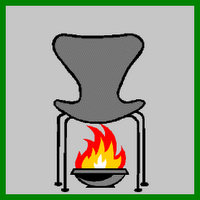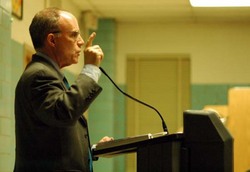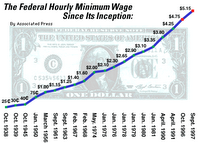
The Washington Post's Jay Mathews doesn't follow many of the rules. Instead of starting out as an education writer and then moving to a more prestigious beat, Mathews first rose to the top covering foreign affairs and then came to the education beat. Still, it took him years writing about education on the side -- including the book that became
Stand And Deliver -- before he could get the Post to let him cover the issue as a reporter.
On the Hotseat, Mathews explains his unorthodox reporting techniques and role as both reporter and columnist. He's unabashed about his support for KIPP schools and Advanced Placement programs, and says he has no regrets about creating the Challenge Index. He says he's not against blogs but doesn't want to write one, and that the midterm election results don't matter much since there's so much agreement between parties these days. And he thinks that most people still don't believe that low-income kids can learn at high levels.
When approaching the dais, what is the proper form of address? “Sir,” ”Mister,” “The Honorable,” or "Jazzy Jay”?Mathews: I am 61, and am doing my best to market myself at the Post by assuming an avuncular role. So “Uncle Jay” would be best.
So, Uncle Jay, tell us the story again about how you ended up covering the education beat after years as a foreign affairs guy?
Uncle Jay: I knew when I was 19 that I wanted to be the Post's China correspondent. It is a great advantage to have that kind of focus so young. It took me awhile, but I did get that job, and then at age 37 had to figure out what to do next. I didn't actually get to be an education reporter formally until I was 52, but I wrote the book about Jaime Escalante, and another one about high schools in my spare time to keep up my morale while I did the usual reporter thing, one damn story after another. And finally they let me do my thing full-time.
For which we're all glad. So what do you make of the big midterm election changes – do they change the immediate prospects for charters, national standards, or NCLB’s survival?Uncle Jay: I don't think they change a thing. The two parties have been remarkably together on all education issues, even the need for standards, testing and accountability, for a long time. The exception is the voucher issue, which I think was designed in part to give each party a perfect education issue to rally its base and beat the other party over the head with. Charters are a little trickier, but as long as there are some very good ones, like KIPP, no smart politician is going to want to come out strongly against them.
Is it true that you, heretic, actually show sources their quotes before finalizing a story? What conceivable purpose could that serve, and do your overseers know about this?Uncle Jay: I try not to talk about that too much. Many people think it is a very bad idea, but I have the opposite view. I have found that my stories are more accurate than they would otherwise be. The sources consulted almost never try to take advantage, and become much better sources in the future because the fact checking process leads them to trust me more.
Even then, I’m sure you’ve made a mistake or two along the way – got any you’d like to get off your chest?Uncle Jay: As my wife and former competing Beijing reporter reminds me often, I predicted in print that the Chinese army would have little influence over the turn of events in China in the 1980s. That was pretty embarrassing. And I did tell everybody I thought Kerry was gonna win big in 2004. Of course I think I am right on everything education related because it is so difficult to actually get at the truth, given the absence of much solid data.
What's it like having your book turned into a major motion picture, and what did the movie lose that was in the book? Uncle Jay: Stand and Deliver began as a project for PBS by two very bright and committed young filmmakers, and so the script was very intelligent, the casting very smart and once it was done it was a wonderful reflection of what went on with Jaime and his kids at Garfield. Alas, I did not receive any money for the movie.
Just how obsessed with advanced placement are you, really? I mean, have you ever dreamed about it, or thought about it at inappropriate times?Uncle Jay: No comment. But I am deeply offended that you failed to capitalize the A and the P in Advanced Placement.
 Got it. What's it like being a beat reporter and a columnist at the same time?
Got it. What's it like being a beat reporter and a columnist at the same time?Uncle Jay: I try to keep my opinions in the columns under control, and present the other side, so the Post will continue to let me do both. My beat for the paper is whatever I think is important on the issue of schools. If a competing publication dumps a big story on us, it is difficult to blame me. I like that. The younger reporters, who have real beats and have to shoulder the blame, probably think this is unfair, but I tell them “Uncle Jay is old and cannot take that kind of stress anymore.”
What about the charge that you are “pro charter” and in particular enamored of the KIPP model? Is it true, and if so how does it affect your work?Uncle Jay: I have been trying for the last 24 years to find schools that work, just as I discovered Garfield did, for low income students. The data from the KIPP schools, compared to what we get from most schools, is very good and very impressive. And when you visit the KIPP schools, you discover they are doing just about everything smart teachers have always told me ought to be done. Since they are the best example I have at the moment of school success in the inner city, and since they are mostly charter schools, I may be seen by some as pro-charter. But if you look at the big stories I have done about charters for the front page of the Post, first with Justin Blum in 2003 and this year with Lori Montgomery, you will see us playing it right down the middle. There are lots of bad charter schools too.
Why no Jay Mathews/Washington Post education blog yet, or is there one in the works? Uncle Jay: That would be WAY too much work. I barely have time to do my job, and answer emails, and worry about the Redskins.
Fair enough. And yet, you’re one of the few reporters I know who has his own Wikipedia entry. What do you think of yours?Uncle Jay: Oh my goodness. I did not know this. I once checked out Jaime Escalante's Wikipedia page to see that it was accurate, but never thought to look for mine. Wait a minute. I will go check. I am figuring you are joking. . . . Well, it is there, very accurate and flattering. I thought Wikipedia was supposed to attract all one's enemies to mar one's legacy. I have escaped, I think, because the Wikipedia main page link to my page spells my name wrong.
That’s Wikipedia for you. Has the spread of education blogs affected your work in any ways, good or bad? Uncle Jay: I wish I had time to read more. They are a wonderful addition to the conversation. Yours is terrific, and a few others have helped me explore interesting topics from new angles. My column this week is on this very topic. I ask readers to send me the links to their five favorite education blogs. I plan to judge them in a future column, along with champion letters to the editor writer Walt Gardner, the star of the column. [Here's the column:
What Are the Best Education Blogs?]
If you were going to make a Challenge Index that measured education journalists rather than high schools, what would the main indicator be, and who would be the top 10 (past or present)?
Uncle Jay: I think I would rate reporters by how many stories they had written from inside a classroom. But that is just my taste.
Speaking of the Challenge Index, which has become increasingly controversial as it’s become more well-known, got any regrets or lessons to share about getting into the school rating business?
Uncle Jay: High schools are my passion, and I think I felt about the work the same way some kids do who collect beautiful butterflies. And this way of looking at schools has allowed me to write about important trends and damaging policies from an entirely different angle, which was and is the point. I have plenty of critics, which is fun because I love a good argument. But I also get many emails from parents and educators at overlooked, and often disadvantaged, schools, thanking me for finding a way to point out the good things they are doing.
I'll take that as a no. What is the most over-done education story of the past year? What is the least adequately covered?
Uncle Jay: The most overdone is the coverage of test scores---SAT, state scores, NAEP. Are they up? Are they down? Over the long term those numbers are important, but we rarely look at the long term. The least adequately covered is special ed--how it works, why so many schools do it poorly, what methods actually help kids.
What's the story you've written that's had the most impact or that you're most proud of, and why?
Uncle Jay: That's easy. Jaime Escalante and the many educators who are proving that low-income kids can succeed in something as difficult as Advanced Placement and International Baccalaureate courses if you give them enough time and encouragement.
But that’s going back a ways. Got anything new or different for us?
Uncle Jay: Unkind people might say that is the only story I have been writing for the last several years. And they would be right. But it remains very important, and it is a truth that is still not believed by most readers or by most educators.

























